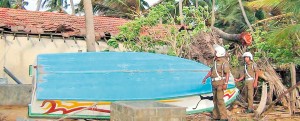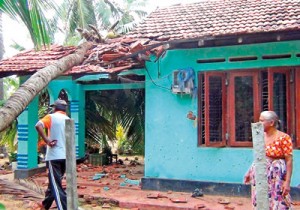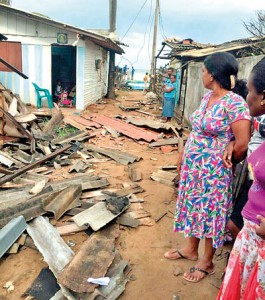News
Heavy downpours in the offing after winds wreck homes
View(s):
A toppled boat (above) amd a damaged house (top) in Kandathoduwawa, Puttalam district. Pix by Hiran Priyankara
By Anushiya Sathisraja
Strong winds wrecked more than 100 houses in various parts of the country, especially in the coastal areas of the Western, Southern, Central and North-western regions this week. But prepare for more rain and wind, weather watchers predict.
According to the Disaster Management Center, strong winds gusted through Gampaha, Galle, Badulla, Puttalam and Kurunegala districts disrupting the lives of 140 people.
In the Badulla district, about 95 families were affected by winds blowing across the Badulla, Passara and Kandekeitya areas.
In Wattala, 132 were affected and 32 houses were partially damaged. In Mahara 64 people were affected and in Divulapitiya 134 people suffered.
 Property damage was also reported from Puttalam and Kurunegala affecting 208 and 247 people respectively.
Property damage was also reported from Puttalam and Kurunegala affecting 208 and 247 people respectively.
Nearly 30 houses were damaged by a gale force wind at Moratuwa on Friday morning. The electricity supply was disrupted. The Ceylon Electricity Board crews are carrying out repairs.
The Disaster Management Centre spokesman, Pradeep Kodippilli, said there were no warnings. “The DMC is not a technical agency but a coordinating one. If we were informed, within a few minutes, emergency operations would have commenced,” he suggested. He advised people to secure roofs and cut down trees that may endanger their property and lives.
The weather forecasters predicted more unsettled conditions.
“Chilly nights and mornings will be experienced throughout the southwestern parts of the country; while the northern and eastern parts will receive heavy showers as a result of the southwest monsoon. The whole island will receive rains for several days. Adding to these weather conditions are the atmospheric disturbances that cause thunderstorms and strong winds,” the Director General of the Met Department, Lalith Chandrapala, said. He warned of rough seas and winds of up to 70 kilometres per hour.
 He said that a drop in the annual rainfall could affect the hydro-catchment areas and that it could have a bearing on water resources. “Of the total water received from heavy rainfall, 37 percent is surface runoff, while 63 percent is retained. Of this, 59 percent evaporates,” he said.
He said that a drop in the annual rainfall could affect the hydro-catchment areas and that it could have a bearing on water resources. “Of the total water received from heavy rainfall, 37 percent is surface runoff, while 63 percent is retained. Of this, 59 percent evaporates,” he said.
The former director of the met department, K. R. Abayasinghe, explained that a small air pressure difference could cause a light breeze, while a large difference could trigger strong winds. He also suggested that Sri Lanka should prepare for natural disasters. “We must build cyclone-resistant buildings where evacuated people can take shelter before a cyclone hits an area or torrential rains bring devastating floods and cause landslides.”
He advised that authorities should assess the risks before the next disaster strikes.

